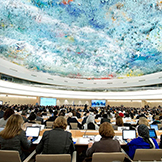Interactive Dialogue on the High Commissioner's oral report on Ukraine
Statement by Ireland
22 March 2017
Ireland aligns itself with the statement delivered on behalf of the European Union and adds the following.
Mr. President,
Ireland thanks the Assistant Secretary-General for his update on the human rights situation in Ukraine and for the important work of the United Nations Human Rights Monitoring Mission in Ukraine.
Ireland is deeply concerned at the recent escalation in violence in eastern Ukraine, and the unacceptably high human cost the conflict continues to exact on civilians. The deplorable increase in civilian casualties is directly connected to the close proximity of fighting to populated areas. The shelling of vital civilian infrastructure has left thousands of civilians without heating and electricity in the depths of winter. Restrictions on the freedom of movement of people crossing or living in the vicinity of the contact line deprive civilians of access to basic necessities and expose them to unnecessary danger and suffering.
It is imperative that all parties fulfil their obligations under the Minsk Agreements. It is troubling that we should have to repeat this call, two and a half years on from the signature of the first Agreement.
Ireland fully supports the vital work of the Monitoring Mission in documenting human rights violations and abuses. It is vital that human rights observers enjoy full and unhindered access to eastern Ukraine and Crimea. We are deeply concerned at the continued violations of basic human rights, and wish to reiterate the importance of fighting impunity and ensuring accountability. The OHCHR’s report on Conflict-Related Sexual Violence in Ukraine provides a disturbing account of the violations and abuses that continue to be perpetrated against vulnerable individuals, particularly those deprived of liberty.
Finally, the persistent curtailment of fundamental human rights in Crimea by the authorities on the peninsula, the use of torture, interference with the activities of lawyers and particularly the disproportionate targeting of the Tatar minority through measures including forced psychiatric examinations, is a source of deep concern to Ireland.
In this regard, we would welcome your assessment of the current situation of Tatars in Crimea.
Thank you.

